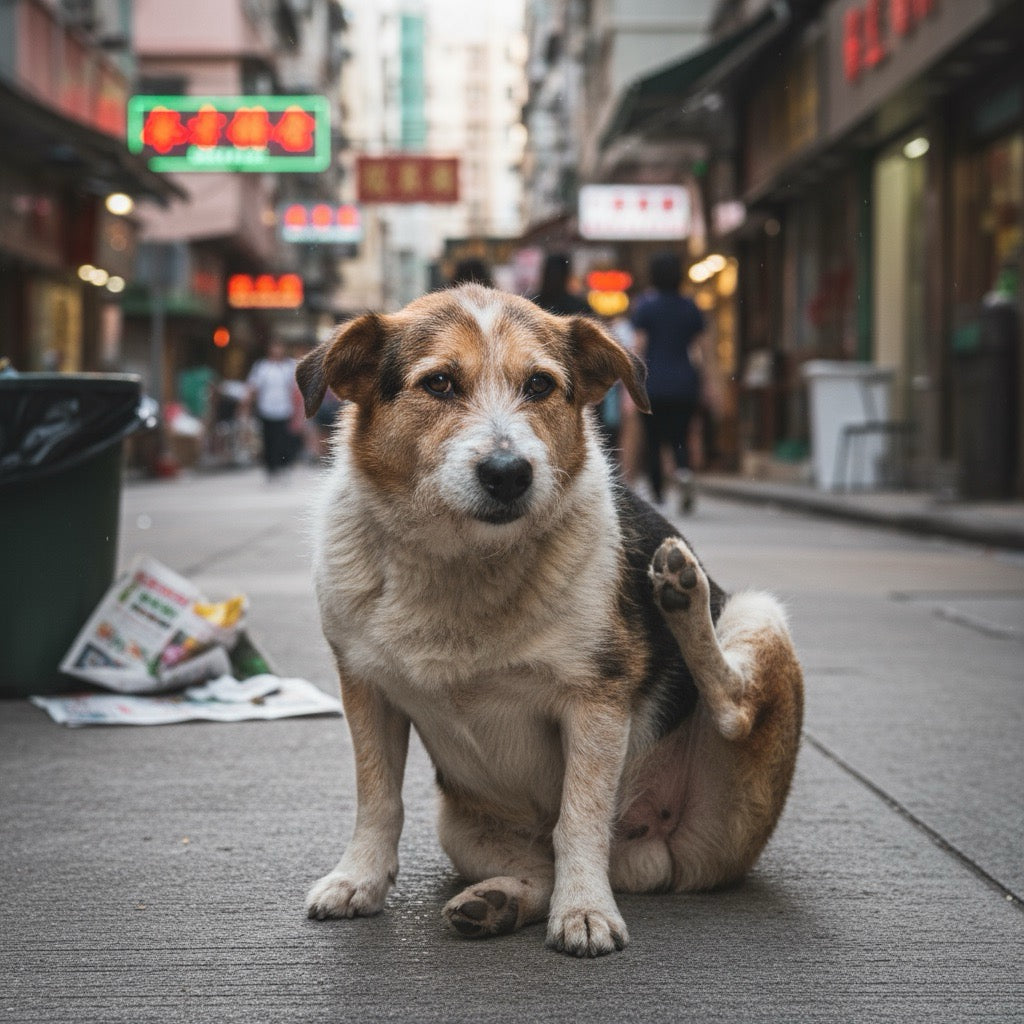
What Causes Itchy Skin in Dogs? (Hong Kong Edition)
Share
Why Is My Dog So Itchy? A Hong Kong Pet Parent's Guide
If your dog is constantly scratching, biting, or licking its skin, you’re not alone. Itchy skin--what veterinarians call pruritus--is one of the most common reasons dogs visit the clinic in Hong Kong. But what actually causes this problem? The answer isn’t always simple, because itchy skin can come from many different sources, often overlapping with each other.
In Hong Kong, the combination of year-round warmth, high humidity, and urban living makes parasites, allergies, and infections the leading causes of itchy skin in dogs. The good news? With proper veterinary care and prevention, most itchy dogs can find relief and live comfortably.

1. Parasites: The Unseen Crawlers
Parasites are a primary culprit for itchy dogs everywhere, but especially in Hong Kong's climate.
- Fleas: Despite regular grooming, fleas remain common in Hong Kong because of the warm, humid climate. Even a single flea bite can trigger severe itching in allergic dogs (a condition called Flea Allergy Dermatitis).
- Mites: Sarcoptic mange (scabies) or demodicosis can cause intense scratching, hair loss, and red, inflamed skin.
- Ticks: More of a concern in dogs that spend time in grassy or wooded areas, ticks can cause local irritation and also transmit other diseases.
👉 Tip: Year-round flea and tick prevention is essential in Hong Kong, where winter isn’t cold enough to break parasite life cycles.
2. Allergies: When the Immune System Overreacts
Allergies are a very common cause of skin issues in dogs, often leading to chronic itchiness.
- Environmental (Atopy): Pollen, mold, and especially dust mites thrive in Hong Kong’s humid apartments. Dogs with atopic dermatitis often chew their paws, rub their faces, and suffer from recurrent ear infections.
- Food Allergies: Some dogs develop reactions to common proteins like beef, chicken, or dairy. Food allergies may look just like environmental allergies, making them tricky to distinguish without a proper veterinary-guided diet trial.
Check out our article on how to spot and treat dogs skin problems : link
3. Skin Infections: Secondary Trouble
When dogs scratch, the skin barrier breaks down, letting bacteria or yeast (like Malassezia) overgrow. These infections worsen the itch, leading to a vicious cycle of scratching and more infection. In Hong Kong’s humid climate, yeast infections are especially common, producing a strong, musty odor and greasy skin.
4. Other Causes
- Dry skin: Air conditioning in summer and heaters in winter can dry out a dog's skin, leading to flakiness and itching.
- Underlying disease: In some cases, hormonal disorders like hypothyroidism or Cushing’s disease may cause hair loss and skin changes that are itchy or prone to secondary infection.
Is Itchy Skin Bothering Your Best Friend?
Provide lasting comfort with our vet-formulated skin and coat recipe. Made with natural ingredients to support a healthy skin
Shop Furry Green Meals5. What Should Pet Parents Do?

If your dog has persistent itching:
- Don’t wait too long: Early treatment prevents worsening infections and unnecessary suffering for your pet.
- Work with your vet: A thorough exam (and sometimes tests like skin scrapings or allergy workups) is needed to find the root cause.
- Avoid guessing treatments: Switching foods or shampoos without professional guidance can delay a proper diagnosis and relief.

6. Pro Vet Tips
- Keep an Itch Diary: Note when the itching is worse (season, time of day, after certain foods). This can provide valuable clues for your vet.
- Routine Parasite Control: Prevention is always easier (and cheaper) than treatment.
- Regular Ear Checks: Ear infections are often the first sign of underlying allergies in itchy dogs.
- Balanced Diet: Don’t jump to exotic or grain-free diets without guidance; nutritional balance is crucial, and a structured diet trial is the only way to diagnose a food allergy.
- Vet Partnership: Chronic itch often requires a long-term management plan, not just a quick fix.
7. FAQs About Itchy Dogs in Hong Kong
Q1: Why does my dog itch more in summer?
Hong Kong’s summer humidity fuels flea activity, dust mites, and yeast infections--three top causes of itching.
Q2: Can grooming help reduce itchiness?
Yes--regular baths with vet-approved shampoos can reduce allergens and yeast on the skin, but over-bathing with harsh products may strip natural oils and worsen dryness.
Q3: Should I try changing my dog’s food first?
It's best not to without veterinary guidance. True food allergy trials must be strict and structured to be effective. Randomly switching foods often prolongs the diagnostic process and rarely solves the problem.
📋 Quick Checklist: Itchy Dog Care
- Monthly flea + tick prevention
- Bathing with vet-recommended shampoo
- Clean bedding weekly (hot wash)
- Vacuum home regularly (dust mite control)
- Note itch patterns (time, season, food)
- Check paws, ears, armpits—common “hot spots”
- Book a vet visit if itching lasts >1 week or worsens
For further reading
-
A Simple Guide to Your Dog's Skin Problems: How to Spot and Treat Them
Managing Food-Related Skin Irritation in Dogs: A Complete Nutrition Guide
Hypoallergenic Fresh Food: Managing Pet Food Allergies with Science-Backed Nutrition
📚 References
- eClinPath: Skin and Allergy Disorders in Dogs
- Muller & Kirk’s Small Animal Dermatology, 8th ed.
- Griffin CE, DeBoer DJ. The ACVD Task Force on Canine Atopic Dermatitis. Vet Immunol Immunopathol. 2001.
- Hong Kong SPCA: Public resources on canine health.
